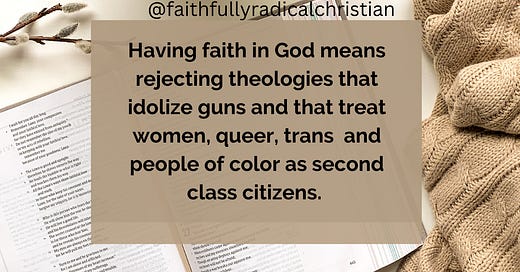What is Faith?
Fundamentalist/Evangelical Christianity has warped our understanding of faith. Instead of faith being understood as the willingness to embrace the mystery of God and the ability to trust and believe in a God who conquers death, even as we are surrounded by oppression and destruction, faith has become a litmus test used to at best exclude people and at worst harass them, when they do not affirm the “correct” beliefs.
Instead of faith being a source of hope that enables us to continue to advocate for a more just and equitable world, Fundamentalist Christianity turns faith into a competition that divides. It becomes a matter of proving to ourselves, to others, and to God, that we have the “most faith.” Faith in God is conflated with faith in the supernatural and a rejection of science. Faith becomes about accepting without question, toxic theological beliefs just because that’s what someone in a position of power claims, “the Bible” or “God says.”
This understanding of faith: as assenting to a rigid set of beliefs even in the face of contrary evidence, turns faith into a yoke that oppresses. We see this when Christians argue that women are to submit to their husbands and cannot be in positions of leadership. Women are expected to have faith that God will reward them for giving up their dreams and minimizing their gifts in the service of men.
We see this in “conversion therapy” theology, which tells queer and trans people that if they want to please God, they need to deny who they are and have faith that God will make them straight.
We see this when televangelists and churches demand that the poor tithe even at the risk of not being able to pay their bills. They are to have faith that even if they give their last dollar to the church, God will ensure that all their bills are paid. “Sow a seed and God will bless you.”
Instead of faith shaping reality, Fundamentalist/Evangelical Christian understandings of faith, require distorting reality to fit into an agenda that benefits those in power. As evidenced in the obsession with the second amendment that too many Christians in the USA display. Instead of letting our faith guide us on how to love our neighbor, faith is used to argue why it’s ok to kill our neighbor or to allow them to die in another mass shooting.
But we can expand our understanding of faith to make room for doubts, questions, and wrestling with theology, the Church, and the Biblical text. In fact, we must. In many readings of John 20:19-31, Thomas often gets a bad rap for demanding to touch the wounds of Jesus. Many Christians hyper-focus on verse 29 when Jesus says, “Have you believed because you have seen me? Blessed are those who have not seen and yet have come to believe.”
But what if Thomas isn’t one to be mocked or ridiculed, but to be emulated? I mean, if Jesus truly had a problem with Thomas’ asking for proof, Jesus would have no qualms saying so. Yet, instead of words of condemnation, the author of John is very much talking to readers who, unlike the early disciples, did not witness the resurrection.
The gospel of John was most likely written between 90 and 100 CE, about 60 years after Jesus’ death and resurrection. The author of the gospel wasn’t saying. “asking questions is wrong and we need to accept theological ideas wholesale” but the author is signaling to readers that even though they didn’t get to experience the resurrection firsthand, their faith is still beautiful and still pleases God. That our faith is still beautiful and pleases God. The author doesn’t even condemn Thomas’ questions and instead presents a Jesus who meets Thomas where he is.
So, instead of interpreting this passage as rejecting the need for questions or proof, we can appreciate its historical context and the author’s desire to encourage believers during their time period and now, that just because we weren’t witnesses to the resurrection as the early disciples were, doesn’t negate the beauty and power of our faith in a God who conquers and defeats both the Empire and death.
In fact, asking questions and even doubting is not contrary to faith, but is an expression of faith. It is easier to put God into a box that can be controlled and it is much easier to hold onto toxic theologies of oppression. But it is harder to stand up to those in power, including those in the church, and say, “your understanding of God is harmful and limited and I reject it.” It is so much harder to acknowledge that we don’t have the answers to everything and yet still trust that God is at work.
As Christians, expressing our faith means having the courage to question and doubt, especially when it comes to harmful and toxic theology. Faith means having the courage to question those in power, even when it may cost us. Having faith in God means rejecting theologies that idolize guns and that treat women, queer, trans, and people of color as second-class citizens.
Image: white desk, with an open Bible, flowers, and a cardigan laid on it. Text: Having faith in God means rejecting theologies that idolize guns and that treat women, queer, trans and people of color as second-class citizens.



